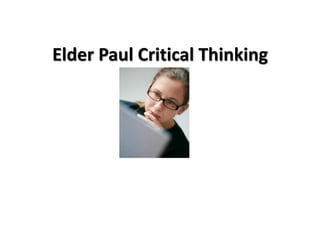
Elder paul critical thinking model
- 1. Elder Paul Critical Thinking Model
- 2. What is Critical Thinking?
- 3. What Keeps us from Thinking Critically?
- 4. Benefits of Critical Thinking • The quality of our life and of what we produce, make, or build depends precisely on the quality of our thought. • Shoddy thinking is costly, both in money and in the quality of our life.
- 6. Clarity We are confused when we are not clear. We are clear when we understand what we are saying, what we are hearing, or what we are reading. Questions you can ask when you want to be clear: Could you say that in other words? Could you explain what you mean? Could you give me an example?
- 7. Be Accurate When we say what is true or correct we are accurate. When we aren’t sure whether something is true, we check to see if it is. Questions you can ask to make sure you are accurate: How could we find out if this is really true? How can we check this? How can we test this idea to see if it is true? How do you know what you are saying is true?
- 8. Be Logical Thinking is logical when everything fits together. You can ask these questions you can ask when you are not sure whether something is logical: This doesn’t make sense to me. Can you show me how it all fits together? The sentence in this paragraph doesn’t seem to belong together. How can I rewrite it so that the sentences all fit together better? What you are saying doesn’t sound logical. How did you come to your conclusions? Explain why this makes sense to you?
- 9. Be Relevant Something is relevant when it relates directly to the problem you are trying to solve, the question you are trying to answer, and whatever you are talking about or writing about. You can ask when you are not sure whether something is relevant: How does what you say relate to the problem being addressed? How does the information relate to the question we are asking?
- 10. Focus on the Significant Something is significant when it focuses on what is important and not what is trivial. You can ask when you are not sure whether something is significant: Which of these facts are most important? Is this the most important problem to consider? Is this the central idea to focus on?
- 11. The Elements of Reasoning 1. All reasoning has a purpose. 2. All reasoning is an attempt to figure something out, to settle some question or solve some problem. 3. All reasoning is based on assumptions. 4. All reasoning is done from some point of view.
- 12. The Elements of Reasoning 5. All reasoning is based upon information and evidence. 6. All reasoning is expressed through, and shaped, by concepts and ideas. 7. All reasoning contains inferences, interpretations, and conclusions. 8. All reasoning leads somewhere, or has implications and conclusions.
- 13. Think About the Purpose Your purpose is your goal, or what you are trying to make happen. Questions you can ask to target purpose: 1. What is the purpose of this assignment? 2. What is my purpose in doing what I am doing? 3. What is my teacher’s purpose?
- 14. State the Question The question lays out the problem and guides our thinking. Questions you can ask about the question: 1. What question am I trying to answer? 2. What is the question we are trying to answer in this activity? 3. Should I be asking a different question?
- 15. Check Your Assumptions Assumptions are beliefs you take for granted. Usually you don’t question them, but you should. Questions you can ask about your assumptions: 1. What am I taking for granted? 2. Am I assuming something that I shouldn’t? 3. What assumption is leading me to this conclusion?
- 16. Gather the Information The information is the facts, evidence or experiences you use to figure things out. Questions you can ask about information: 1. What information do I have to answer this question? 2. What information do I need to answer this question?
- 17. Watch Your Inferences Inferences are conclusions you come to. It’s what the mind does in figuring things out. Questions you can ask about information: 1. What conclusions am I coming to? 2. Are there other conclusions that I should consider?
- 18. Clarify Your Concepts Concepts are ideas you use in thinking to understand what is going on. Questions you can ask to clarify concepts: 1. What is the main idea? 2. What idea am I using in my thinking? Is this idea causing problems for me or for others?
- 19. Understand Your Point of View Point of view is what you are looking at and the way you are seeing it. Questions you can ask about point of view: 1. How am I looking at this situation? 2. What am I looking at? And how am I seeing it? 3. Is there another reasonable way to look at the situation? Or is my view the only reasonable view?
- 20. Think Through the Implications Implications are the things that might happen if you decide to do something. Consequences are the things that do happen when you act. Questions you can ask about implications: 1. If I decide to do “X”, what things might happen? 2. If I decide not to do “X”, what things might happen?